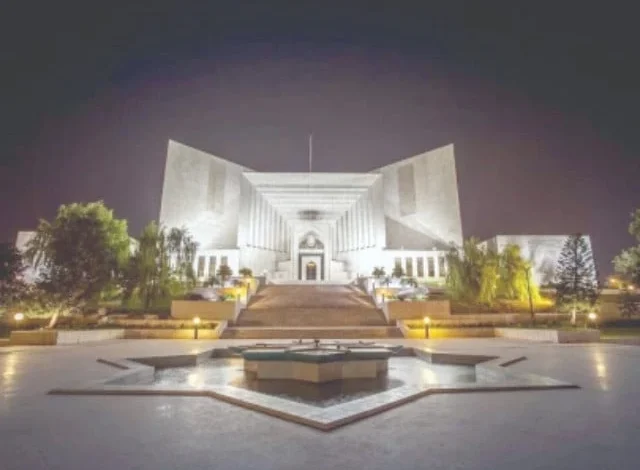PM permits SC to give its projects approval.

In order to authorize development plans worth up to Rs1 billion, the government has permitted the Supreme Court of Pakistan (SC) to establish its own project licensing board. As a result, the law ministry no longer has the authority to approve apex court initiatives.
For the first time, if a development project is less than Rs1 billion, the Supreme Court can design it and get it authorized without consulting the government.
Ahsan Iqbal, Minister for Planning and Development, told The Express Tribune on Friday that Prime Minister Shehbaz Sharif had approved the Supreme Court’s creation of its own Departmental Development Working Party (DDWP).
The planning ministry had asked the prime minister to clarify if the court may have its own agency to approve development projects in response to an order from the highest court. According to sources, the PM gave the apex court permission to establish its own working party after approving the ministry’s summary.
But even with approval, a significant obstacle still exists. Citing financial limitations, the National Economic Council (NEC) has prohibited DDWPs from sanctioning new projects until the International Monetary Fund (IMF) program is finished.
According to the development project handbook, plans must be approved by the Executive Committee of the National Economic Council (ECNEC), the Central Development Working Party (CDWP), or DDWPs.
A federal secretary from the relevant ministry chairs the DDWP, which has the authority to approve projects worth up to Rs1 billion. Schemes up to Rs7.5 billion are approved by the CDWP, which is chaired by Ahsan Iqbal, the Deputy Chairman of the Planning Commission and Planning Minister. Ishaq Dar, the foreign minister and deputy prime minister, chairs the ECNEC, which approves projects worth above Rs7.5 billion.
According to officials, at first, the Planning Commission was hesitant about the Supreme Court creating its own organization. As a constitutional body, the court was seen as autonomous and separate from the federal government.
According to documents, in December of last year, the Supreme Court informed its own DDWP. The Planning Commission retorted in January that DDWPs for self-financed projects could only be established by autonomous authorities.
These authorities approve projects that are either self-financed by independent entities or funded by the Public Sector Development Programme (PSDP).
According to the planning ministry, DDWPs could only be established by federal ministries and divisions. According to guidelines outlined in the December 2021 Manual for Development Projects, these are led by a secretary or the Principal Accounting Officer of an administrative division.
Subject to approval by their boards of directors or governors, autonomous entities are permitted to approve their own self-financed development projects from their separate DDWPs.
The Supreme Court is not a ministry or division; rather, it is a constitutional body.
Currently, the Supreme Court’s projects are managed by the Ministry of Law and Justice in accordance with the 1973 Rules of Business.
The Prime Minister’s Office was notified by the planning ministry that the court had instructed the planning secretary to forward the notification case to the PM for directives last month.
A new reference was also sent by the Supreme Court. It maintained that it must have the independence to plan, develop, and authorize infrastructure projects in compliance with its institutional mandates since it is a constitutional entity under Article 175 of the Constitution. The court requested that its registrar, who doubles as the principal accounting officer, lead the DDWP.
Neither the Parliament nor the federal government have any control over the Supreme Court of Pakistan’s spending. Parliament approves the expenses of constitutional authorities such as the Senate, National Assembly, Election Commission, and Supreme Court without having the authority to reject or lower the requested sums.
The apex court might not be able to approve any of its projects right away, even with official approval, until the NEC removes its embargo on DDWP approval of development proposals.
The prime minister-led NEC halted DDWPs from authorizing new projects until the IMF program was finished in June of this year. The prohibition was put in place in order to save resources. In order to avoid CDWP scrutiny, the planning ministry had noticed that DDWPs were dividing huge projects into smaller ones.
In response to a query, Ahsan Iqbal stated that the NEC alone has the authority to lift the moratorium, and that, too, is contingent upon available funds.
The government has set aside Rs1 trillion for development expenditures for the current fiscal year. This is half of what active initiatives require in terms of funding. Seven years ago, the development budget accounted for 3% of the GDP; today, it represents less than 1% of the economy.
Even with this small funding, the planning ministry is having trouble making the most of it. It only used a small portion of the available funds in the first two months of the fiscal year.